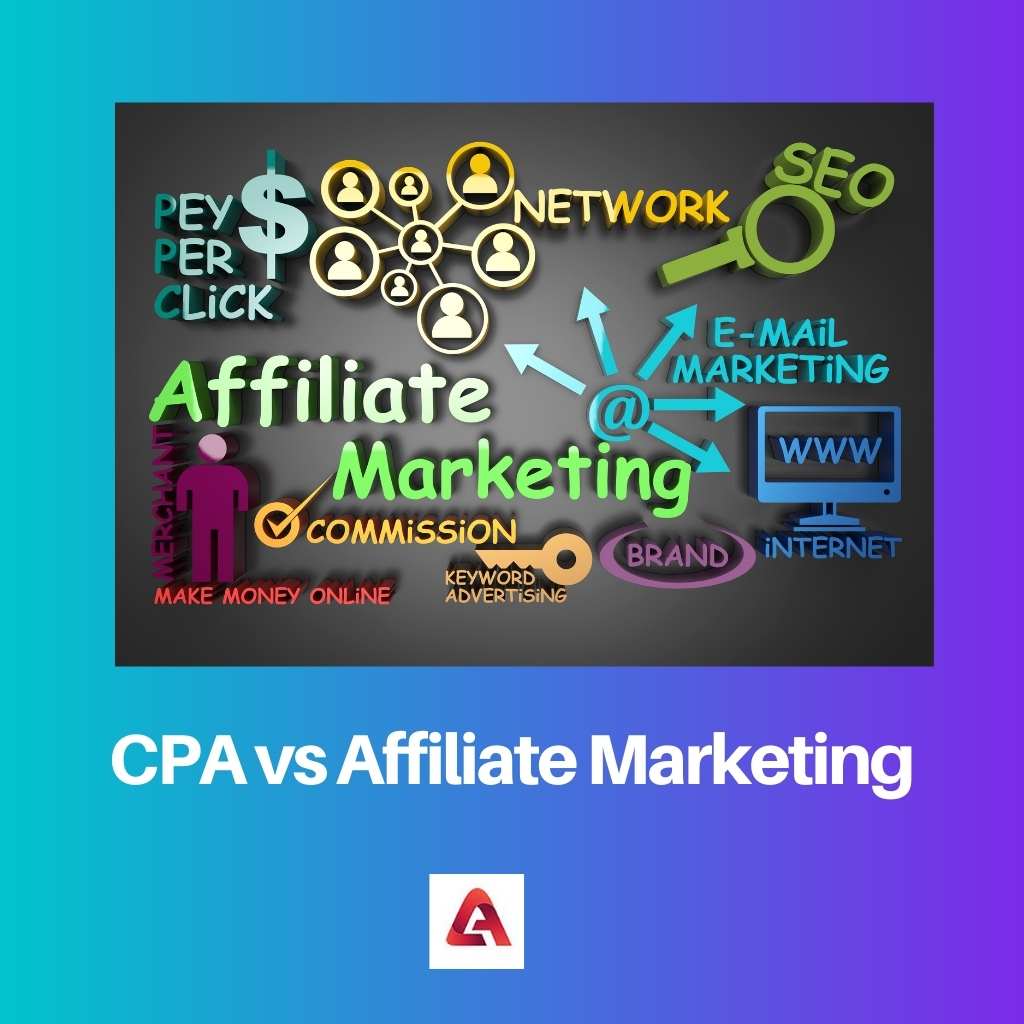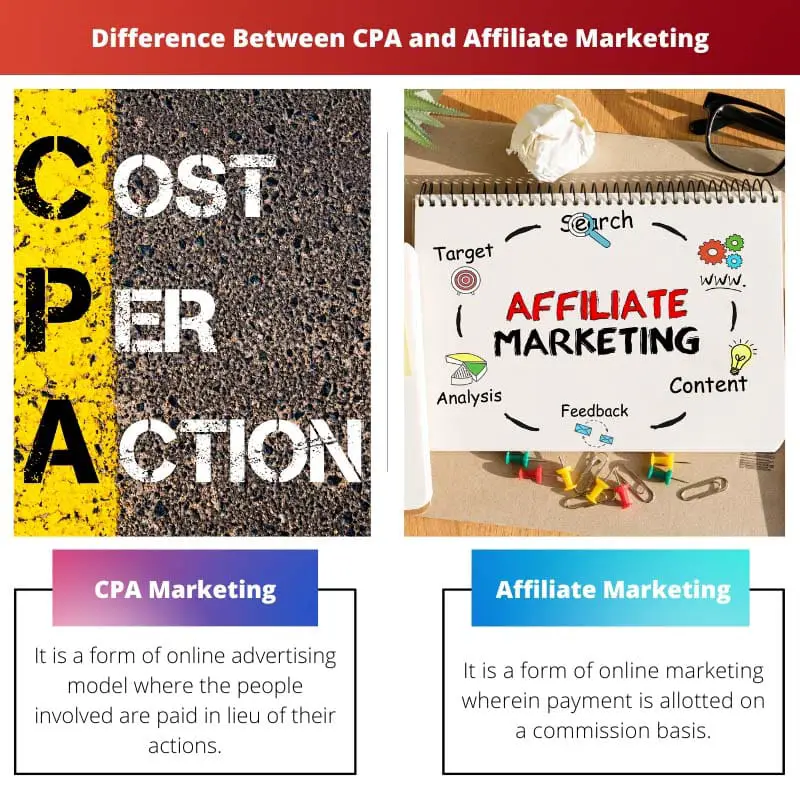Technical jargon can get pretty confusing. With the evolution of technology occurring at a rocket pace, it is usual to be clueless to a certain amount.
Online trading is the next best thing, with goods and services being shipped and delivered across time zones. Both CPA and affiliate marketing refer to marketing models that are based on an online platform.
Key Takeaways
- CPA (Cost Per Action) marketing is performance-based marketing where advertisers pay for a specific action completed by users. In contrast, affiliate marketing involves earning a commission for promoting and selling a company’s products or services.
- CPA focuses on generating leads, sign-ups, or other user actions, while affiliate marketing emphasizes generating sales and revenue for the company.
- CPA and affiliate marketing rely on the marketer’s ability to attract, engage, and convert online audiences.
CPA vs Affiliate Marketing
CPA (Cost Per Action) advertising is focused on a specific action, while affiliate marketing is focused on promoting a product or service to a broader audience. CPA advertising is used for lead generation, while affiliate marketing is more commonly used for promoting e-commerce products.

CPA stands for cost per action or, sometimes, cost per acquisition. This marketing model is operated online to help sell the products and services.
CPA is considered to be a platform by itself as it contains networks that include the different sellers of the products and services. It can be considered a virtual market that poses several stalls or, in this case, sellers in itself.
Affiliate marketing is the oxygen needed by most online trading companies. This is due to their high effectiveness. Affiliate marketing primarily helps take care of all aspects of an online business that would ultimately sell the product or service.
This could mean designing the website, attractive advertising, user guides, reviews provided, etc.
Comparison Table
| Parameters of Comparison | CPA Marketing | Affiliate Marketing |
|---|---|---|
| Definition | It is a form of online advertising model where the people involved are paid in lieu of their actions. | It is a form of online marketing wherein payment is allotted on a commission basis. |
| Sales | CPA marketing is independent of sales. | It is dependent on the number of products and services sold. |
| Payment | They are paid with respect to the activities that occur due to their actions. | Every sale earns a stipulated payment amount. |
| Scope | CPA is categorized under affiliate marketing. | Affiliate marketing has a wider scope. |
| Payscale | By comparison, CPA marketing has a lesser return ratio. | The scope of earning in affiliate marketing is high. |
What is CPA Marketing?
CPA expands to stand for cost per acquisition or cost per action. CPA marketing is a well-known online advertising model.
This concept promotes the payment of publishers based on an action that they take, which can be considered a direct result of their marketing. This predominantly takes place in blogs and site promotion.
The action does not have to be a sale in cost per action– it can be a click, filling a form, or registration.
CPA is preferred for its policy that allows for payment to occur even before or without a sale. An increase in the interest level and viewership count of the website due to CPA actions would result in a payment.
Despite the strict protocols that exist before getting into this field, it is highly sought-after.
CPA is applicable for almost all products and services. It is also available in a wide niche range. The CPA-related actions could be email submissions, filling forms, installing apps, sales calls, downloading ebooks.
CPA marketing is essentially a subdivision of affiliate type of marketing. Therefore, it falls under affiliate marketing. CPA marketing also pays a considerably lesser amount when compared with its parent concept.
What is Affiliate Marketing?
The term affiliate refers to the official attachment of a person or an entity affiliated or associated with a bigger body. The marketing of affiliate concept is an online marketing medium.
Affiliate marketing is purely based on sales. The person involved earns their commission when they successfully promote the products and services of another company.
Online platforms are undoubtedly a leading platform for several significant trading functions. Affiliate marketing helps improve sales by providing links to several products and services on different social media pages, websites, applications, blogs, etc.
These advertisements viewed by the target audience can lead to a potential sale. The partner or affiliate earns a commission with every sale made by viewing the links to the products and services.
Affiliate marketing has a strict sale-based pay scale that can be described as a cost-per-scale model.
Affiliate marketing is present in most companies due to its sheer effectiveness. The person involved in affiliate marketing can be accurately called a mediator or middleman involved in making the business and the customer meet.
The affiliate puts up a link for an advert on a website that a viewer clicks. This would lead them to the product page, where they make a purchase.
The affiliate network records the transaction, and the purchase is confirmed. Upon which, the commission is paid to the affiliate.

Main Differences Between CPA and Affiliate Marketing
- While CPA is related to networks and platforms that include several sellers with different products and services, affiliate marketing is related to the seller of the good or service.
- CPA marketing is an online advertising model. Affiliate marketing is an online-based marketing platform.
- While CPA marketing is not related to sales, affiliate marketing is closely related to sales.
- The CPA marketer is paid for his actions and their resultant activities. Affiliate marketer earns a commission for every sale they’re responsible for.
- CPA marketing falls under affiliate marketing and carries a lesser pay. Affiliate marketing offers more in terms of pay and has a wider scope.

- https://search.proquest.com/openview/dfd9fd05badf64a1b51886833a7f4346/1.pdf?pq-origsite=gscholar&cbl=41065
- https://www.emerald.com/insight/content/doi/10.1108/07363760510595986/full/html?journalCode=jcm
